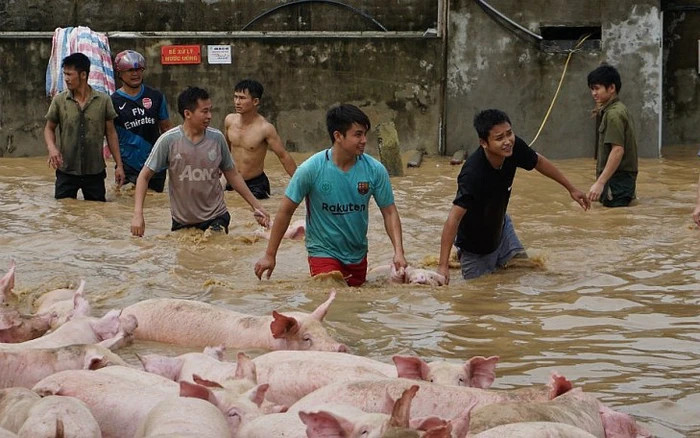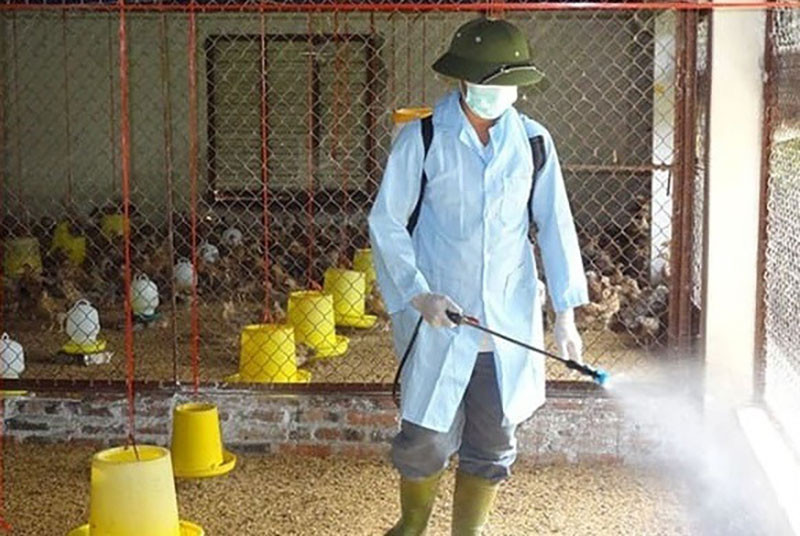The North is in the rainy and stormy season. This is an opportunity to spread pathogens and cause food shortages for livestock and poultry.
To minimize damage in livestock farming during this period, the Department of Animal Husbandry and Veterinary Medicine of Hai Duong province recommends the following measures to livestock farmers:
1. Before the storm
Before the rainy and stormy season, farmers must prepare sturdy barns, reinforce roofs, and support columns to limit roof damage when there are strong winds. The curtain system must be tied tightly to prevent rain and wind from entering the barns, especially in barns with young animals, pregnant animals, old and weak ones, etc.
Wastewater drainage ditches and waste storage areas of the farm must always be cleared to prevent congestion and pollution. The barn floor must be raised, and animals must be proactively relocated when there is a risk of rising water. Provide lighting for animals in case of power outages due to storms.
Feed sources for cattle and poultry must be stocked from the beginning of the season. Absolutely do not feed animals moldy or expired feed.
Stocking density must be appropriate in terms of quantity and age compared to the area and conditions of the livestock facility. Strictly implement biosafety farming processes to prevent external pathogens from entering the livestock area.
Spraying disinfectants at a poultry farm in Ninh Giang district
Proactively vaccinate livestock before the rainy season. Note to vaccinate against infectious diseases such as anthrax, foot and mouth disease in buffalo and cow; swine fever, septicemia, foot and mouth disease, blue ear in pigs; Newcastle disease, Gumboro, avian influenza in poultry. Periodically disinfect inside and outside the barn to kill pathogens.
2. During and after the storm
– Barn
During the rainy season, farmers regularly check barns to proactively handle incidents caused by storms. When the ambient temperature drops, there must be a plan to warm the livestock. Check the drainage, if clogged, clear it immediately, do not let rainwater flow back into the barn. Regularly clean barns, feeders, drinkers, and livestock equipment.
Periodically spray disinfectant twice a week or sprinkle lime powder to disinfect barns and farm areas.
– Care and feeding
Animals must always be kept in a dry, clean place, away from the cold; provide adequate feed. In the case of brooding at this stage, farmers should use complete mixed feed; supplement vitamins, minerals, digestive enzymes, etc. for animals to improve resistance.
– After storms and floods, it is necessary to clean the barn, spray disinfectants. Continue to supplement vitamins and minerals to improve resistance for animals.
– Disease prevention and treatment
Check and detect early abnormalities in animals. Timely isolate animals with unusual symptoms, signs of infectious diseases and immediately report to local authorities and veterinary staff for timely intervention measures, avoiding outbreaks and spreading.
Nguyen Minh Duc – Department of Animal Husbandry and Veterinary Medicine of Hai Duong Province
Source: Hai Duong Newspaper


